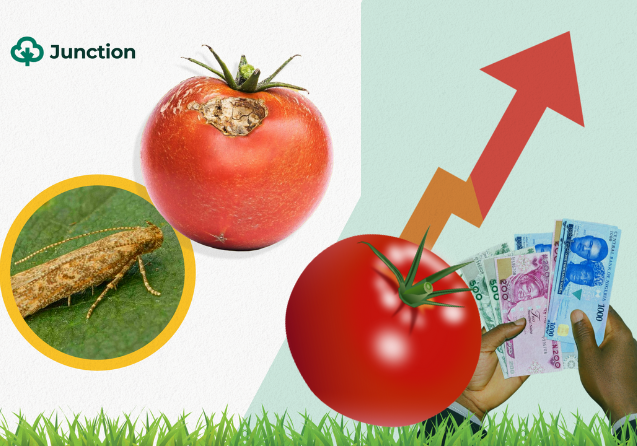Questions answered in this article: - What is the state of Nigeria's tomato production and what recurring problems plague the industry? - How do major Tuta absoluta outbreaks affect the price of tomatoes in Nigeria, historically? - What efforts have been ongoing to combat the infestations and what are the lapses in this efforts that can be fixed?
Tomato is one of the most important vegetables. It is a short-duration crop, depending on the varieties planted, and typically gives a high yield, which makes it economically attractive. Tomatoes contribute to a healthy, well-balanced diet. It is rich in minerals, vitamins, essential amino acids, sugars, dietary fibres, vitamins B and C, iron and phosphorus. Processors are spoiled for ways to process the crop, including output forms such as paste, ketchup, puree, powder and juice.
According to the Food and Agriculture Organization (FAO) data, Nigeria was the 12th largest tomato-producing nation globally in 2021 with about 3.6 million metric tonnes (mmt) and came second only to Egypt (6.2mmt) in Africa.
While this rank falls below its 2020 position (11th, with 3.7mmt), the country has a comparative advantage and potential to lead the world in tomato production and exports.
Unfortunately, it still experiences a deficiency in critical inputs, a lack of improved technology, low yield and productivity, high post-harvest wastage and a lack of processing and marketing infrastructure. The domestic demand for tomatoes and their by-products far outweighs the supply to cater for over 200 million people, leading to dependence on imports.

The northern regions of Nigeria are the primary producers of tomatoes in the country because of geographical factors. Small and medium-scale farmers do most of this production.
While Nigerians continue to combat tomato production and processing issues, another major problem is the Tuta absoluta. Also commonly known as Tomato Ebola, the insect ravages tomato farms and causes a decline in production.
The Federal Ministry of Agriculture and Rural Development (FMARD), in March 2023, reported that it had destroyed over 300 hectares of farmland in Kano, about 15% of the usual farmland area used to grow tomatoes in the state. It spread to other tomato-producing Nigerian states like Katsina, Kaduna, and Gombe, with the possibility of spreading even further.
However, this was not the first time that the country is experiencing the infestation. Nigeria began experiencing it in 2015, and the first major outbreak occurred in 2016. Then, there was another major one in 2020 before the one in 2023 happened.
It is gradually becoming a periodic trend in Nigeria. FMARD has a less-than-practical solution to the problem that involves looking for huge funds first. Meanwhile, there is a need for drastic steps to combat this outbreak.
This article outlines possible solutions to combat the spread of Tuta absoluta. Part of what you will see here includes understanding the pest life cycle and mode of operation, acceptable Integrated Pest Management (IPM) protocol to curtail its effects, and more.
What is Tuta absoluta?
Tuta absoluta is the most severe naturally occurring impediment to tomato production. It is caused by a type of moth that directly physically damage crops and indirectly facilitate the entry of other infectious pathogens like viruses, bacteria, fungi, and nematodes.
They are highly destructive insect pests to tomato plants that can cause damage to the leaves, stems, flowers and fruits. Tomatoes are the primary host of these pests but can feed and develop on other solanaceous plants such as potatoes and eggplants.
The pest is indigenous to the Andes region of South America but can now be found in Europe, Asia and Africa. Its lifecycle contains four development stages: egg, larva, pupa and adult, completed within 30 to 35 days. The larva is the most destructive stage of the pest.
The female moth lays between 250 and 300 whitish-yellowish eggs in dispersed forms at both the underside and upper side of the plant leaves, preferably at apical shoots, stems, and sepals.
These eggs gradually change to brown towards maturity. The egg hatching takes a short period, at least four to six days of incubation. The larvae produced from the hatched eggs feed on any stage of tomato plants, mainly apical buds, leaves, stems, and fruits, and cause maximum (100%) yield losses.
How does Tuta absoluta infestation occur?
The moth is a migratory pest that quickly spreads from one farm to another. This aggressive, exotic insect can adapt easily to its new environment and reproduce without notice until it begins to cause damage to the plants.
What moths feed on comes down to the stages of their life cycle. The adult moths don’t feed on leaves but on the nectar from flowers, fruit or sap. Some moths can survive several days without feeding, and this short period is enough for them to mate and lay 250-300 eggs before they die.
The eggs hatch to form larvae which develop into pupae, and then the pupae mature into adult moths. When allowed to complete its life cycle, a single moth can produce an average of 250 moths in 40 days.
How to identify affected plants
A survey of tomato fields and surrounding habitats infected by these moths will show extensive damage. Visible signs include extensively wilted whole plants associated with severely damaged leaf and stem. The shoots will look distorted with signs of dieback, dead hearts and wilting. Meanwhile, the leaves will show lesions of different sizes, large necrotic areas, wilting and chlorosis.

Economic impact and effects of tomato ebola
In the larvae stage, the most destructive form of pest, it feeds on leaves, stems and fruit at any stage of the tomato’s development, reducing fruit yield and quality. Without effective pest control measures, the pests can cause 100% loss to the crop.
Whenever there is an outbreak, the price of tomatoes is expected to increase. Between May, June and July of 2016, there was an estimated 150% to 170% increase in tomato prices associated with the infestation. In 2020, it was estimated to cause a price bump of 100%. The 2023 outbreak is expected to cause even higher price hikes as it comes at a time when the government removed fuel subsidy. Already, market research and projections show the price rising by 150% in some places and up to 400% in other regions.
Ongoing efforts to control and manage the infestation in Nigeria?
Since the first outbreak of Tuta absoluta in Nigeria, different integrated management pest control has been used to combat the infestation. Farmers have used hand picking, spread ashes on the crops and sprayed pesticides. These control measures have been ineffective, considering the losses recorded during the past outbreaks.
The most prominent method has been the use of pesticides. However, one of the main challenges of using this control is that the pest reproduces slowly. Many generations emerge annually, allowing them to develop resistance to major pesticides available in the country quickly.
Emerging technologies and innovations in managing Tuta absoluta
Different crop protection and farm practice measures have been implemented in the agricultural industry to enhance production and protect crops from pests and diseases. These integrated pest management (IPM) systems include agricultural and cultural controls, improved managerial practices, and insecticides.
Integrated Pest Management (IPM)
Various strategies have been developed and implemented to manage these destructive pests. Here is a timely review of the up-to-date development and practical implementation of IPM programs for tomato crops across different states in Nigeria.
Agronomic and Cultural Control:
There is emerging research to reduce the spread of the moth by using agronomic practices designed to help reduce its spread. Some of these practices include tillage operations, which involves digging, stirring, and overturning the soil in preparation for planting.
Farmers can also grow species of tomatoes that are resistant to the pest. Crop rotation, choosing crops that the pest can’t feed on, will prevent the accumulation of infestation on farms. Then, there is the pre-emergent pesticide application method that removes the unwanted organisms, including the pests, to prevent them from fighting germinating crops for available water, soil nutrients, and sunlight.
In conventional agriculture, it is common practice to use tillage operations and insecticides to kill insect pests as it helps reduce their population in the soil. The disadvantage is that these broad-spectrum insecticides destroy beneficial organisms like earthworms along with harmful ones.
Chemical control:
There are agrochemicals presently developed that can destroy these insects effectively. Research shows that active ingredients such as Chlorantraniliprole, Lambda-Cyhalothrin and Emamectin Benzoate effectively control the moths in the larva and pupa stages.
Using these insecticides and adjuvants is a new development that will help reduce application failure. It helps the insecticides to penetrate and spread on the plants while preventing rain from washing them away. Agricultural adjuvants are additives that can be used together with herbicides, insecticides, and fungicides to make them more effective. They cannot be used on their own, but they significantly enhance the activity of other crop protection products.
Biological control:
Using mass trapping methods to reduce the population of the insects has proven effective in controlling pests. Synthetic pheromones can induce the natural sex pheromones that female moths secrete for male attraction and elicit courtship behaviour to lure the male moth into a trap. This trapping method has proven to distort the mating system of the moths and their moth population.
Another method of trapping involves using light and detergent. The light is used to attract the moths, and detergent with water helps to trap them.
The National Horticultural Research Institute (NIHORT) developed a simple technology, called Tray Trap Technology (TTT), that can attract, trap and kill more than five thousand adult moths per tray. This innovation has recorded success in controlling the pests spread in Nigeria.
The technology consists of a tray filled with water containing a small amount of detergent (without foam). A lamp is placed on a solid support at the centre but not wholly dipped into the water. The whole system is placed on the farm where the lamp can easily be visible without any obstruction from attracting the adult moths.
Potential risks and challenges associated with the control methods
As already established, this infestation increases the price of tomatoes and their processed commodity. This will alter the diet of the average Nigerian as tomatoes become unaffordable for many. However, while fighting these pests, most farmers may abuse insecticides. For example, during the feeding stage, larvae hide within mined leaf mesophyll and bored fruits, safe from chemical spray. In addition, some species can quickly develop resistance to insecticides.

Research and innovation opportunities for improving management
Agricultural practice
Speaking to several farmers in Nigeria makes it clear that the use of adjuvants with chemicals is rare in the country. This practice helps reduce the volume of chemicals in use and make the application more effective without altering its function. Using resistant cultivars in not yet public practice as well, and there is a need for continued research.
However, other recommended agronomic practices can help reduce the spread of these pests. Primary and secondary tilling of the field before cultivation, for example, and application of insecticides, will help destroy their larvae and pupae and reduce their population in the long run.
Extension services and Tuta absoluta
Extension services are essential for disseminating innovations to farmers. Without it, most research will end up on shelves. Farmers need training on best agronomic practices and knowledge of innovations. For example, when Agromall, a Nigerian agriculture extension company, conducted training in Gombe and Oyo states, the farmers in these regions didn’t know about Tuta absoluta until they experienced the outbreak first-hand. If they had been sensitised and trained to prevent and manage their farm in case of an outbreak, perhaps the recorded losses might be lower.
Conclusion
Nigeria can eliminate the Tuta absoluta pest or at least mitigate the adverse impact on tomato prices by implementing tested and sustainable IPM control measures.
Utilising agronomic and cultural control methods, along with chemical and biological measures, would have aided farmers in maintaining tomato yields and preventing the drastic price hikes witnessed in 2023. While challenging, this period allows for establishing robust protocols that effectively and durably address future infestations, ensuring a return to normal tomato production levels.



